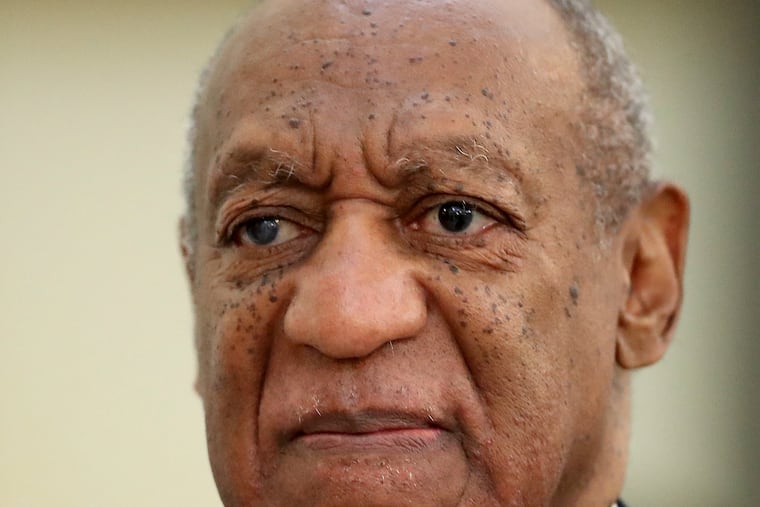Cosby’s lawyers seek new trial at Harrisburg hearing, testing limits of #MeToo-era justice
The 82-year-old comedian's legal team asked the court to overturn his sexual assault conviction. The questions they raised strike at an area of law that is rapidly evolving as a parade of high-profile men have found themselves in court facing similar assault claims.

HARRISBURG — Bill Cosby’s lawyers urged a panel of Pennsylvania appellate judges Monday to overturn his sexual assault conviction, setting the stage for a ruling that could shape the future of the #MeToo movement’s push to hold celebrity abusers accountable in court.
For roughly an hour, attorneys jockeyed before a panel of Superior Court judges on two key issues: whether it was fair to include testimony from five additional women who accused Cosby of assault, and whether a past prosecutor had agreed never to prosecute the comedian — or even had the authority to do so.
The judges did not issue a ruling Monday and did not set a timetable for doing so. But they aimed many of their most contentious questions at attorneys for the 82-year-old comedian.
Cosby was convicted last year solely in the 2004 assault of central accuser Andrea Constand, but the jury in his case heard testimony from the five women, a fraction of the 19 witnesses whom the prosecution sought to call.
While prosecutors in the Montgomery County District Attorney’s Office argued that the additional testimony was appropriate because it served as evidence of a larger pattern, Cosby’s attorneys contended that was a stretch.
“Everything is different,” Cosby attorney Kristen L. Weisenberger said, noting that some of the cases stretched back decades, that the women had professions ranging from waitress to flight attendant, and that one woman said she did not recall an assault.
But President Judge Emeritus John T. Bender, only moments before, had pressed her on that very point: “The reality of it is, he gives them drugs and then has sex with them. That is the pattern, is it not?”
Pennsylvania law allows evidence of “prior bad acts” only in limited cases that show an alleged crime was part of a larger picture, not a mistake, or to rebut defense claims of consent.
Whatever the court decides, its ruling is likely to have repercussions for future cases. The questions raised by Cosby’s legal team strike at an area of law that is rapidly evolving as a parade of high-profile men have found themselves in court facing similar assault claims.
As people such as Hollywood producer Harvey Weinstein and singer R. Kelly have been brought down by criminal assault charges in the last two years, the question of what role, if any, allegations that fall outside the statute of limitations should play in their criminal trials has emerged again and again.
If their questioning provides any hints, the judges may also choose to weigh in on another issue that could have sweeping effects on how these types of cases are handled.
Cosby’s attorneys also claim that the comedian secured a promise from former Montgomery County District Attorney Bruce L. Castor Jr. that he would never be charged with assaulting Constand — a vow that the comedian says prompted him to give deposition testimony in a 2005 civil suit that was used against him at trial.
While Cosby’s attorneys claim there was an oral agreement — a notion they say is supported by a deposition — both the Montgomery County District Attorney’s Office and some of the judges questioned whether there was enough proof, noting that a formal agreement was never signed and approved by a court.
Bender asked whether it was commonplace in the District Attorney’s Office to have a court approve any prosecution agreements that are meant to apply in perpetuity, with future elected officials bound to them as well. The answer was a simple “Yes.”
Cosby attorney Sarah Kelly-Kilgore urged the court to focus on the effect such an agreement — or Cosby’s belief that one existed — had on his statements in the deposition.
“We can stand here today, and I think we can all agree that we would have done things differently in the past,” Kelly-Kilgore said.
Monday’s hearing unfolded without the two central players in the case present. Cosby is jailed at a state correctional facility in western Montgomery County, serving the minimum three-year sentence he received in September. He’s in the general population, according to a corrections spokesperson.
Constand weighed in on Twitter, saying she hoped the verdict would be upheld. “The wheels of justice," she wrote, "are again in motion today.”